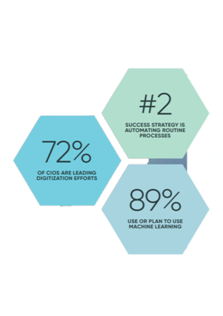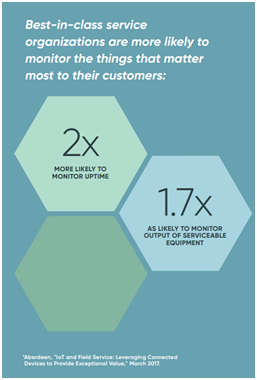
3 Strategies for Driving Customer Service Innovation with ServiceNow
With the rise of changing business models and customers getting the driver seat of every service it is very important to understand how customer experience can be transformed by using latest intelligent tools and technologies and adding business value
Artificial intelligence and intelligent technologies are a key driver of digital transformation and are demonstrating significant ability to improve customer and employee experiences. Artificial intelligence and intelligent technologies describe a collection of technologies that can be used to perform tasks normally requiring intelligence, such as visual perception, speech recognition, or decision making. These include technologies such as analytics, workflow, automation, algorithms, machine learning, and natural language processing.
These technologies are transforming our everyday lives—virtual assistants that automate texting and communication, facial or retina recognition used for security, fraud detection to warn us of anomalous charges, and maps that can predict arrival times based on current traffic or shortcuts. Intelligent technologies will ultimately benefit a wide range of industries, however, customer service is already seeing real and tangible benefits from the strategic application of these technologies to speed and improve the servicing and resolution of customer concerns.
In order to drive customer service innovation, companies should consider the following three strategic uses of intelligent technologies:
- Deliver engaging, personalized experiences that increase customer satisfaction
- Increase the efficiency and effectiveness of issue resolution
- Continuously improve and optimize service processes
1.Deliver engaging, personalized customer experiences
Delivering world-class customer experiences relies on effective communication. The ability to convey concerns, issues, and problems successfully from the customer to the service agent is critical to delivering a personalized, successful outcome for the customer. Intelligent technology can assist customer service agents in their communication and tasks-at-hand.
- Make knowledge smarter. Technology that is context-aware, or knows a customer’s products, orders, usage, and history, can be used to dynamically tailor recommendations and content, quickly getting the customer to the right information, at the right time. This same technology can analyze the customer’s problem and intelligently recommend best-fit solutions for the customer service agent.
- Provide engaging communities. Customers can take advantage of instant and personalized self-service in communities while engaging with relevant content, experts, and information. As customers share their interests and insights, companies can learn more about customer needs and trends.
- Take advantage of chatbots and virtual agents. Computer generated characters help scale customer interaction. At their simplest, they can speed navigation of a phone menu, but when combined with transactional capabilities, virtual agents are able to perform automated actions and have intelligent conversations with users, helping them get answers faster. For example, placing order requests, resetting cable boxes, downloading software updates, or other actions to resolve issues immediately.
2.Increase the efficiency and effectiveness of issue resolution
Intelligent technologies help improve operations and customer satisfaction. Specifically, they automate routine processes and remove obstacles, enabling service organizations to more effectively and efficiently handle service requests.
- Intelligently route and categorize cases. Intelligent technology automates the categorization, prioritization, and assignment of incoming customer service requests, efficiently routing them to the right agents with the right skill sets. This eliminates routine tasks, shortens response times, and frees agents to focus on more complex work.
- Intelligently automate workflows. All business processes are comprised of a sequence of activities. Intelligent technology analyzes system data, identifying clusters of topics, actions, or past behavior that could benefit from automation; then it enables the visual building of end-to-end worflows.
- Monitor predictively. A network of physical devices with embedded software or sensors, the Internet of Things (IoT) connects and exchanges data to enable proactive monitoring of devices, infrastructure, and systems. Using customer context and IoT together to extrapolate and predict potential failures or issues, service organizations are then able to take proactive, corrective action before the customer even becomes aware of an issue.
- Proactively manage issues. Using anomaly detection capabilities, intelligent technology correlates thousands of events, identifying patterns that are likely to result in a future issue. By then comparing similarities of incoming events with these patterns, using location, usage, or other criteria, it determines which customers might be affected for communications and remedial action.
3.Continuously improve and optimize service processes
Customer service organizations are looking for productivity and efficiency gains, while maintaining a keen eye to increasing customer satisfaction. One key to success is analyzing daily tasks and, where possible, automating and enriching these tasks to provide better outcomes for customers.
- Create knowledge automatically. As agents respond to cases, intelligent technology automatically creates new knowledge and adds it to the central knowledge base. This efficiently improves and enriches the company’s overall knowledge base without requiring additional resources.
- Direct to next best action. Intelligent technology is used to guide agents as they get customers to issue resolution as quickly and effectively as possible. Starting with the customer context, it dynamically analyzes and adjusts agent guidance, allowing agents to stay focused on the customer, follow step by step instructions, alerts, and guidance.
- Optimize schedules. By analyzing and balancing varied data, such as agent availability, skill set, number of cases solved, workload, cancellations, and more, intelligent technology optimizes for a specific outcome and processes workforce and task assignments, surfacing exception cases for resolution when necessary.
- Take data-driven action. Analytics enables your organization to work smarter by easily identifying areas of improvement and quickly re-mediating issues at the source—before they turn into problems.
The ServiceNow customer service solution
With ServiceNow Customer Service Management, your organization can resolve complex issues end-to-end, intelligently fix problems before customers even know they have them, and drive actions to instantly take care of common customer requests. Our solution combines intelligent technologies with automated actions, to reduce support costs and increase customer satisfaction. This automation enables your organization to be forward-looking and strategically focused on driving new business and speeding transformation.
Built on the ServiceNow platform, it gives you the ability to drive innovation with efficient application development and the ability to connect and align enterprise applications. It incorporates intelligent technology that increases the quality of customer service through proactive, strategic automation. And it delivers a modern user experience that is omni-channel, personalized, and quickly connects customers to the information and experts necessary for rapid issue resolution.



